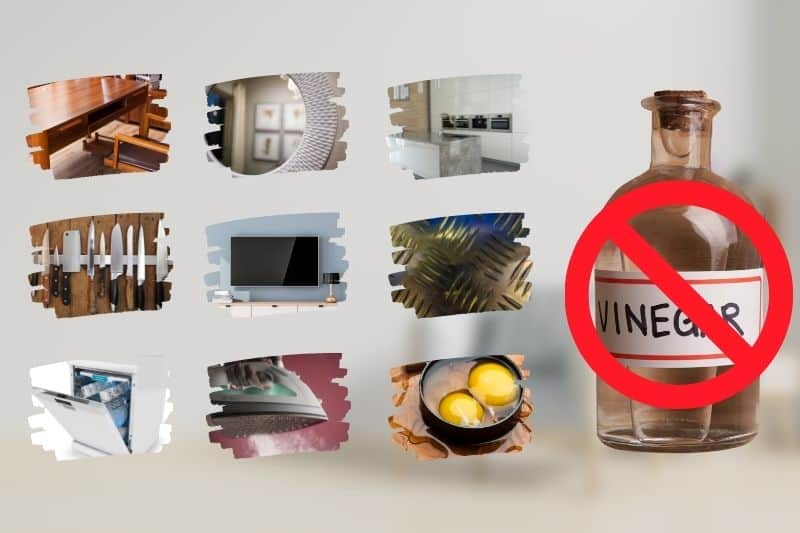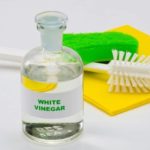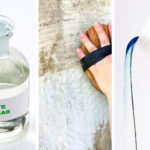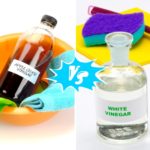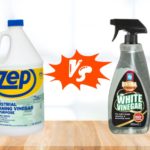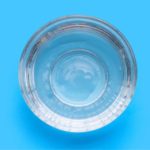Vinegar is a home-cleaning essential. Used for generations, this cheap liquid is great for scrubbing your windows and drizzling on your chips. While it’s more eco-friendly than commercial all-purpose cleaners, it can also ruin some surfaces thanks to its high acidity.
I’ll tell you about nine things you shouldn’t clean with vinegar in this cautionary guide, providing alternative cleaning methods along the way. Then, I’ll answer some more vinegar-related cleaning questions. Let’s keep vinegar as a cleaning solution, not a cleaning problem.
1. Wood Furniture
Undiluted vinegar will feast on your wood furniture, leaving streaks and discolouration. Many wood finishes won’t be able to survive the acid in vinegar.
You can gently polish wood furniture with a homemade 50-50 mix of olive oil and white vinegar though. If you’ve used too much, dab away the excess with a clean, dry cloth. The oil will temper the vinegar’s acidity, keeping your wood finish intact.
If you’re trying to get rid of dirt on wood furniture, you should use mild soap or diluted detergent. You should clean the wood finish gently to avoid dulling or staining.
2. Mirrors
Since vinegar is so effective at window cleaning, you’d think the same would go for mirrors. They’re both glass, right?

Mirrors use glass, but they have a silver backing which is sensitive to acid corrosion. If the vinegar seeps through the glass coating, it’ll ruin your mirror’s shine.
To clean mirrors, you could instead use plain old Windex or another store-bought glass cleaner.
You could also try this homemade glass cleaner recipe, which mixes hot water, rubbing alcohol, corn starch, orange essential oil, and lemon essential oil. This fruity mixture should give your mirrors a streak-free shine without involving vinegar.
3. Knives
Knives are dangerous, but they’re no match for vinegar!
Using vinegar to remove rust from knives could also remove the knives’ sharpness and shine. The acidic vinegar will eat away at metal after repeated exposure.
Instead, you should gently clean your kitchen knives with warm water and soap after every use to discourage rust from forming.
4. Granite, Marble, or Stone Countertops
Marble countertops are an investment, and you don’t want them spoiled by some ordinary vinegar.
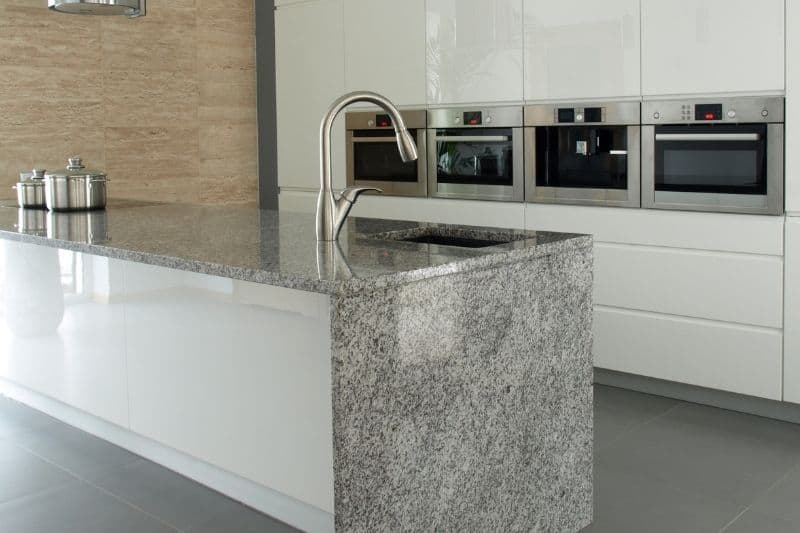
Granite, marble and stone are natural stones, which are susceptible to pitting and fissures. Vinegar can destroy the sealant protecting the stone, making your kitchen countertop dull and cracked.
You should use washing up liquid and a microfibre cloth to clean natural stone. You could also use a specialist granite cleaner product, or try making a homemade granite cleaner by filling a spray bottle with a quarter cup of rubbing alcohol, three drops of dish soap, and water.
5. Dishwashers
Vinegar is excellent for breaking down stubborn grime, but its acidity can also break down the inside of your dishwasher.
Your dishwasher is full of metal components that are sensitive to acid, so I don’t recommend using vinegar to clean it.
Instead, you could try cleaning your dishwasher with bicarbonate of soda. Sprinkle a tiny amount of bicarbonate of soda onto the dishwasher floor, then leave it undisturbed with the door closed for several hours.
Finally, run a cycle without any dishes in the machine, letting the bicarbonate of soda fight any food residue.
6. Steam Irons
Vinegar can easily chip away at limescale, but you shouldn’t try to remove limescale from your steam iron with anything acidic.
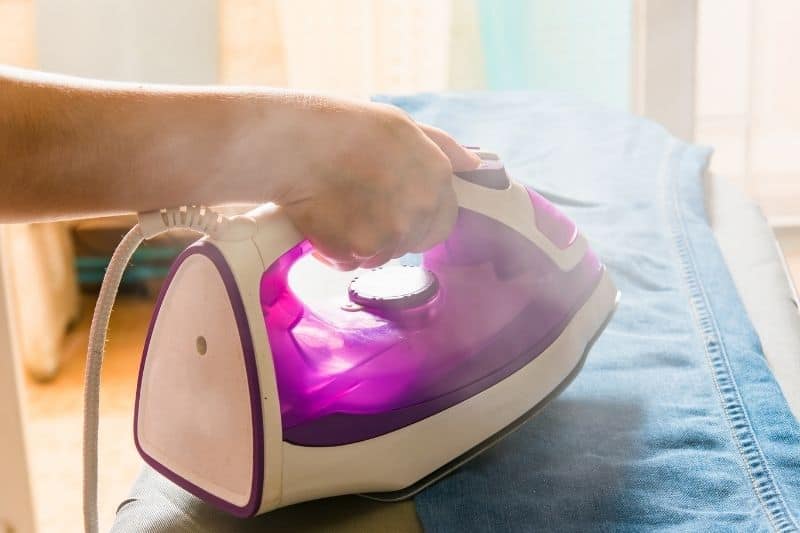
The inside of the iron is filled with metal, rubber, and plastic components. Introduce vinegar to them, and they won’t last long.
You can simply use water if your steam iron is capable of self-cleaning. Alternatively, you could scrub the soleplate with plain white toothpaste or stick two teaspoons of bicarbonate of soda into water to achieve the same effect.
7. Egg Spills
The way I’ve been describing vinegar, you’re probably imagining that this acidic liquid could burn its way through anything. Vinegar reacts differently with eggs, though.
Use vinegar to scrub an egg stain, and you’ll cause the egg proteins to clump together, making the mess stickier.
Wipe away egg spills with a cloth and soapy water. You can also sprinkle sparkling water onto an egg dropped on a carpet or soft furnishing to help solidify the mess.
8. Metal Surfaces
Vinegar will devour the protective coatings on metals like iron and aluminium.
Unless you want discoloured and scratched doorknobs, you should stick to cleaning metal surfaces with a dishcloth soaked in warm soapy water.
9. Electronic Screens
If you want to keep your screens scratch-free, keep vinegar away from them.
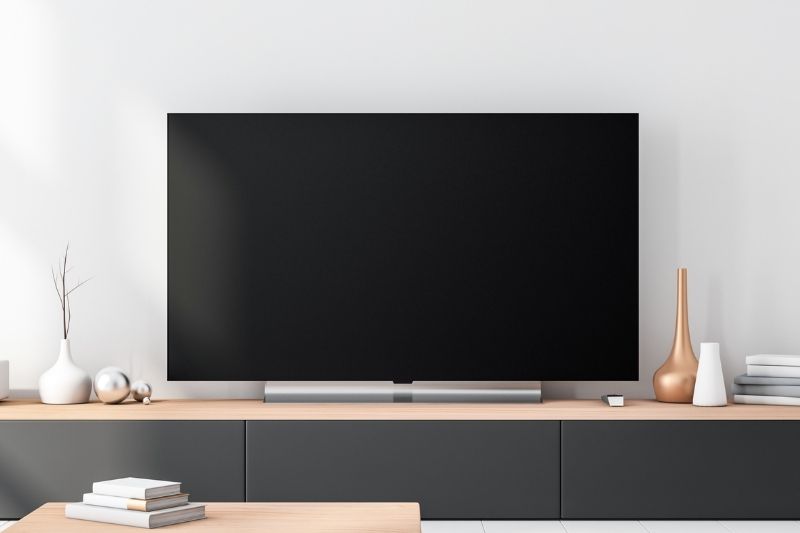
Vinegar will damage the coating from electronic screens, like smartphones, TV screens, tablets, and other LCD screens.
Use a microfibre cloth to wipe a dusty or streaky electronic screen. You can use a spray solution to sanitise screens safely. For example, Screen Mom is a cheap screen cleaner solution available on Amazon.co.uk.
What Is Vinegar?
After reading about all the things you shouldn’t clean with vinegar, you may be wondering why vinegar is so prone to damaging different surfaces.
Vinegar is a mixture of water and acetic acid, with the weakest vinegar containing 4% acetic acid by volume. Acetic acid is typically made by fermenting ethanol, and it’s capable of dissolving various oils, salts, and sugars.
Ideal for dissolving limescale, vinegar is a diluted acid that can also burn through the protective coatings applied to household furniture and appliances.
Does Vinegar Kill Germs?
Vinegar can dissolve some substances, but it isn’t effective at fighting bacteria.
Vinegar can miss up to 20% of sickness-causing bacteria, like the germs that cause colds and flu. Therefore, vinegar isn’t an effective sanitiser.
To keep your home sanitised, you should purchase a disinfectant that removes 99.9% of viruses and bacteria. You can find these in most supermarkets, and some stores, such as Tesco, offer eco-friendly options for antibacterial cleaners.
Should I Rinse Surfaces After Cleaning with Vinegar?
If you’re set on using vinegar to clean the surfaces listed above, you should ensure that you rinse with water afterwards.
Without rinsing after applying vinegar to surfaces, the vinegar may leave an acidic residue which will eat through numerous materials. You should also try to further dilute your vinegar with water to weaken the acid’s effects.
Conclusion
Vinegar is a household favourite for both cooking and cleaning. However, this acidic substance shouldn’t be used to clean certain surfaces, as it tends to eat away at protective coatings.
Wood furnishing, metal, mirrors, and natural stone are all vulnerable to acid and shouldn’t be cleaned with vinegar. Vinegar will also turn egg spills into a gluey mess.
Vinegar and other acidic solutions, like lemon juice, can still be effective eco-friendly cleaners when used on the appropriate surfaces. Just be careful where you drizzle acid!

A recent uni graduate who likes writing, gaming, and drawing. I’m figuring out housekeeping tips alongside you while trying to provide eco-friendly cleaning options. Let’s find out how to use a tumble dryer together!
